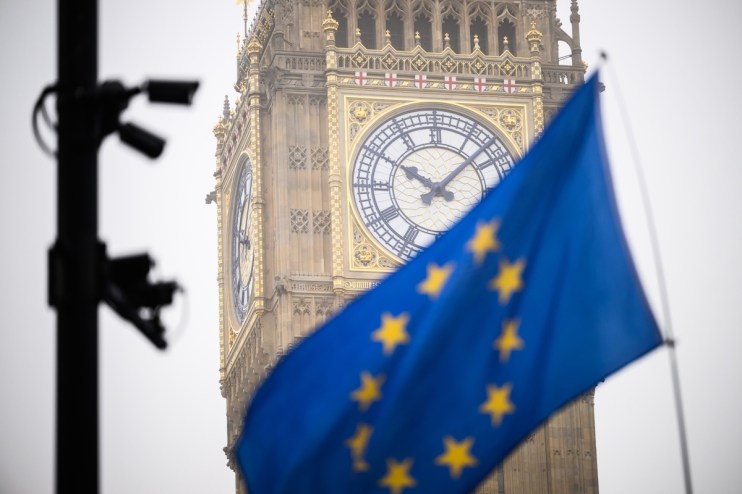UK and Canada suspend Brexit trade negations in row over beef and cheese

Britain and Canada have halted trade negotiations after talks fell apart in a disagreement over food, specifically beef and cheese, but other sectors are also set to be impacted.
The agreement collapsed after Canada had been urging Britain to row back a ban on hormone-treated beef, which had been a thorn in the side of negotiators. The result would be less favourable terms of trade for UK farmers.
The UK and Canada had been negotiating in the last two years or so since Britain formally left the European Union, and it looked for new deals outside of the EU.
A deal had been put in place for protecting trade in items such as cheese and cars from higher tariffs, but it expired in December, leading to duties of almost 250 per cent.
Car firms could also experience higher costs in April when that part of the agreement ends.
British car firms could see higher tariffs from April on exports, when an agreement is due to expire.
Downing Street on Friday said the Government remained open to restarting talks, but only if terms were favourable.
“We will only negotiate deals that deliver for the British people, and that we reserve the right to pause negotiations where progress is not being made. We’re open to restarting talks with Canada in the future,” a spokeswoman for the Prime Minister said.
She said that the benefit of leaving the EU was that the UK was “able to insist on the detail of each and every deal to ensure that it works specifically in the UK’s interests”.
Business and Trade Committee Chair Liam Byrne said; “The Government has learned a lesson – trade negotiations are tough, even with close friends like Canada. There are difficult trade-offs and both sides have their minimum demands and red lines.”
Hubris has now collided with cold, hard reality. Having tried to run trade policy on bluff and bluster, the Government is waking up to the fact that we can’t just churn out free trade agreements on a conveyor belt – unless we keep caving in and just give other countries everything they want every time.”
The British Chambers of Commerce said the suspension of talks was “unwelcome news”.
William Bain, its trade policy head, said: “For our dairy exporters and parts of our manufacturing industry the loss of key trade preferences puts them in a worse position than before 2020.
“Government must help these sectors through difficult times and open up new markets for our goods and services.”
Meanwhile, Mike Hawes, the chief of automotive body SMMT, said it was “especially disappointing and sends a signal that the UK’s world-class automotive products are not welcome in Canada”.
“If UK car exports can’t use EU parts and components to avoid additional duties it creates a risk that tariffs, potentially charged on top of luxury goods taxes, could be reintroduced. This would benefit no one, not least Canadian consumers, and we urge all parties to get back around the negotiating table,” he said.
A UK Government source said Canada appeared to have “lost sight of the bigger picture – the British and Canadian businesses who do £26 billion worth of trade a year and the people they employ”.
The source added: “If Canada come back to table with a serious offer and desire to make progress we’re all ears, but in the meantime we’re going to focus on other trade deals that deliver for UK businesses.”
Ralph Goodale, Canada’s High Commissioner in the UK, said his country was “disappointed” with the pause.
“Trade is a 2-way street,” he said in a post on social media. “We too have an obligation to ensure deals that benefit OUR people.”
The Government’s stance won the backing of farmers. Minette Batters, president of the Nation Farmers’ Union of England and Wales, praised the Government for having “stuck to its line and not given way”.
She told BBC Radio 4’s Today programme it was essential that hormone-treated beef is not allowed into the country.
“It is a relief for farmers. This has been going on for a long time and it is about enhancing the trading relationship between the UK and Canada.
“Trade on agricultural products is always the first thing to be discussed and the last thing to be agreed. I am pleased the Government has stuck to its line and not given way,” she said.
Ms Batters added: “Canada has played hardball for a long time. It was always going to come to a crunch point as to who was going to capitulate.”
Shadow business and trade secretary Jonathan Reynolds said: “This is very concerning news and another significant failure from the Conservatives to honour their promises.
“Rather than strengthening our trading position post-Brexit these failures have left us in a weaker position, particularly for the automotive sector.
“This is another blow to the British economy because of Conservative incompetence. It is clear that they are unable to deliver what we need to get our economy growing.”
Meanwhile, Commons Speaker Sir Lindsay Hoyle said ministers should have made a statement to MPs about the halt in trade talks.
He told the Commons: “I will say it is amazing how quickly the Government come to give good news. I just hope that they might reflect on briefing out overnight. As I say, I always believe this House should hear it first.”
Dominic McGrath, Rachel Vickers-Price, and Helen William – PA